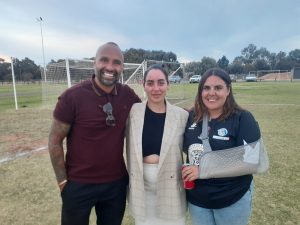Football: a reflection of Australia’s diversity
Archie Thompson says football brings people and communities together.
And the former Socceroo has some personal evidence for his assertion. He was born in Papua New Guinea to a New Zealand father and a local mother.
He grew up in NSW, and played most of his football in Melbourne but also turned out for soccer clubs in Belgium and the Netherlands.
“Football brings communities together. It has this power because it is a global sport,” he says.
“When I’ve seen refugees or other people struggling with hardship, there’s usually a football somewhere.
“The game is a way people come together to support each other; and countries can come together over the sport. It’s something familiar to a lot of people who may have been displaced from their homes.
“It’s a beautiful thing – the power football has to bring communities and countries together.”
Archie is speaking in Mildura, one of Australia’s most multicultural regional cities, as the VIP guest at a multicultural football tournament aimed at building community connections and social cohesion.
Now in its third year, the AMES Multicultural Cup has introduced many newcomers to the local mainstream soccer competition, and it has helped to forge links between diverse communities living in Mildura.
Archie played in two matches in the tournament – much to the delight and surprise of his newfound teammates; he spoke at the tournament dinner, posed for a hundred selfies and inspired a group of young players from a dozen different countries.
Mildura is home to about eighty different nationalities, with many migrants and refugees working in the local agriculture and fruit industries.
Founded by American irrigators and populated by successive waves of Greeks, Italians, Turks and Croatians before and just after WWII, Mildura has always been a melting pot.
 But more recently refugees from Africa, Afghanistan, Burma and the Middle East have made the sundrenched city on the Murray their home.
But more recently refugees from Africa, Afghanistan, Burma and the Middle East have made the sundrenched city on the Murray their home.
“I have an affinity with multicultural communities. And I love the vibe here in Mildura where people, from all over the world have settled and seem to get on and appreciate each other’s culture,” Archie said.
“My mum is from Papua and New Guinea – a place I visited for the first time recently for a TV project,” Archie says.
“It’s a beautiful place and it gave me some new perspectives on my own life and the world.
“Australia has always been multicultural, we are a multicultural nation, and we can connect with so many parts of the world,” he says.
Archie says his visit to Mildura stirred memories of his childhood.
“I grew up in country town and played football. I loved the game but later on, as a professional, competing came to feel like work,” he says.
“So, through pressure to win, I lost my love for the game, which is when I stopped.
“That’s why it is beautiful to come to something like this tournament.
“I’ve met some lovely people, and everyone has been really welcoming. Events like this fill the heart and the soul.
“Now I play on Saturdays. I saw a group of guys playing near where I live, and I asked if I could join. There are players from different backgrounds, and we all enjoy each other’s company.
“Football brings all different communities together. So many people have football in common, it’s a universal language,” he says.
Archie played 50 times for Australia, scoring 28 goals, and was a member of the Melbourne Victory team that won three A League Championships.
He was in the squad for the 2006 FIFA World Cup, the 2001 and 2005 FIFA Confederations Cup, the 2007 AFC Asian Cup, the 2008 Summer Olympics and the successful 2004 OFC Nations Cup.
Archie holds the all-time goal scoring record for a single international match, in which he scored 13 goals in a 31-0 victory over American Samoa in 2001.












